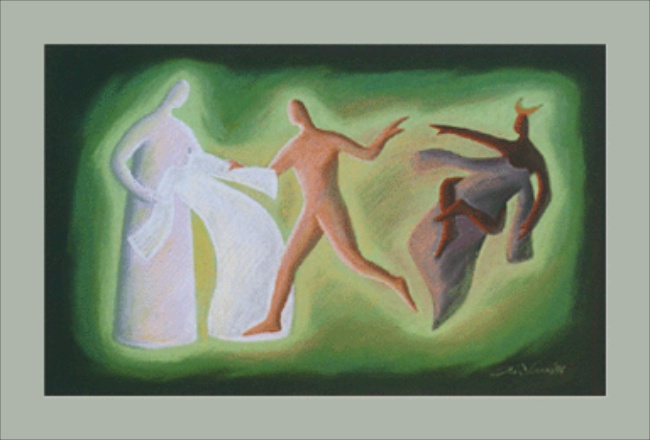
So I tell you this, and insist on it in the Lord, that you must no longer live as the Gentiles do, in the futility of their thinking. They are darkened in their understanding and separated from the life of God because of the ignorance that is in them due to the hardening of their hearts. Having lost all sensitivity, they have given themselves over to sensuality so as to indulge in every kind of impurity, and they are full of greed.
That, however, is not the way of life you learned when you heard about Christ and were taught in him in accordance with the truth that is in Jesus. You were taught, with regard to your former way of life, to put off your old self, which is being corrupted by its deceitful desires; to be made new in the attitude of your minds; and to put on the new self, created to be like God in true righteousness and holiness.
Therefore each of you must put off falsehood and speak truthfully to your neighbor, for we are all members of one body. “In your anger do not sin”: Do not let the sun go down while you are still angry, and do not give the devil a foothold. Anyone who has been stealing must steal no longer, but must work, doing something useful with their own hands, that they may have something to share with those in need.
Do not let any unwholesome talk come out of your mouths, but only what is helpful for building others up according to their needs, that it may benefit those who listen. And do not grieve the Holy Spirit of God, with whom you were sealed for the day of redemption. Get rid of all bitterness, rage and anger, brawling and slander, along with every form of malice. Be kind and compassionate to one another, forgiving each other, just as in Christ God forgave you.
(Ephesians 4:17-33)
On February 7th, Ps. Anna Ng spoke at Emmanuel Methodist Church about what life as a born-again Christian ought to look like. Ps. Anna began by telling a story of a man who wanted to quit smoking. He threw his pipe out the window, but then immediately rushed downstairs, in time to catch the pipe before it landed on the ground.
“I think a lot of times, we know what to do,” Ps. Anna said. “We want to make changes in our lives, but our moving and doing are incongruent and inconsistent. In many ways, we still cling on to our old selves, as if we were never born again.”

This is what Paul is talking about in this passage. As Christians, we have embraced a new life and a new self in Christ. He first talks about the rationale, and then about how we can practically apply it to our lives, as the church, and as individuals.
Ps. Anna first looked into the rationale, which she referred to as the Learnt Christ.
Part I: The Rationale
1. Learnt thoughts of the past.
As man, we are subjects—not objects, and so we are always looking for a meaningful and purposeful life. We have self-potential and capacity, and are always looking to make meaningful connections to the objects around us to fill the vacuum and needs within us. And so, as we grow in stages of life, we try to achieve tougher and higher goals with new adventures.
To reach a meaningful life is to pursue something that must be counted valuable and worthy, such as high education, a good family, good career, good marriage, and so on. Our desires are limitless, and we fulfill our dreams through stages of accumulation. For example, when you buy a house, before you even move in, you’re already thinking about buying a bigger house. Whenever we reach a goal, we feel that our need is met, but it’s always temporary.

Human beings are comprised of many dimensions. We are made up of spiritual, emotional, and physical aspects. We possess moral ethics and values, and appreciate aesthetics. We are cultural, scientific, philosophical, religious, and seek wisdom as well as spiritual thought. After the fall, however, our thoughts became a single, flat dimension.
This is what Paul describes in verses 18-19:
“They are darkened in their understanding and separated from the life of God because of the ignorance that is in them due to the hardening of their hearts. Having lost all sensitivity, they have given themselves over to sensuality so as to indulge in every kind of impurity, and they are full of greed.”
A one-dimensional life is one that lacks depth and substance. It has no regard for the past or future, but focuses solely on the present fulfillment of happiness and indulgence of sensuality. It constantly craves high stimuli to numb the pangs emptiness—the spiritual vacuum within.
Problems arise when we try to fill this infinite vacuum with the finite self. We end up falling into an endless cycle that leads to more futility. In reality, this vacuum inside of us can only be satisfied by the dwelling of the eternal God. We must pursue the infinite God’s presence and allow Him to fill the vacuum within us. For believers, Christ now dwells in us, and our futile thinking must not continue.

2. Learnt Christ of the present
Paul uses three verbs to describe what we have obtained from “Christ’s School.” We have come to know Him, we have heard of Him, and we have been taught in Him. Paul addresses how the flat dimensional life is in the past for the believer.
We have obtained an inward power imparted by the Holy Spirit, and a binding presence of Christ in the heart, resulting from a life that is rooted in love. This love gives power to comprehend the width, breadth, length, and height of God. That is the full scope of divine purpose. The redemptive activity of God brings us back to the fullness of all dimensions.
The ultimate goal of our lives is that it is filled with the fullness of God. We make all the connections with God, and that gives us meaning and purpose. Without Christ, whatever we achieve is still only one-dimensional. That is why it is important for Christians to understand and acknowledge that God is the ultimate meaning and purpose in our lives.
Paul also talks about the lived Baptism: to put off the old self and put on the new self. This is an interaction between the flat and full dimensions. The old self concerns only the temporary, while the new self allows God to interact with us and fill us with His fullness.
Since we have obtained new life in Christ, we obtain a new mind and a new thought. Our thinking now should act against how we thought in the past. Our old self was corrupted by deceitful desires, but the new self is created to be like God in true righteousness and holiness. The distinctions are obvious: Deception vs. righteousness.
That is why it is necessary to cultivate a new mind in our daily lives. When God’s fullness has filled us, there will be no longer be any space for emptiness. Unless we understand and acknowledge Christ, there is no way to find satisfaction and abundance in our Christian life.

Part II: The Practical Application – Lived Christ.
How do we behave with a new mind? What does the new self look like?
1. To Self—Rejecting Self-centeredness
a) Deceit vs. Integrity—Speak the truth in community
The old life was full of deceit. The Bible reveals to us that without Christ, our lives are actually full of lies. We tell ourselves that by doing good deeds, we are righteous enough. Even as Christians, we tend to we continue to live without allowing God to make meaningful connections in our daily living. That is why Paul reminds us that we need to reject self-deception and also within the church community.
b) Carnality vs. Holiness—Love binds the fellowship
When life abounds, so does the flesh. Negative emotions like anger, bitterness, indulgence of every kind of impurity, hatred, unforgiveness and resentment will pull people apart when they overtake us and disrupt relationships. Whenever our flesh is manifested, holiness of life will come crumbling down, and the fellowship of the love of God and in Christ will be destroyed.
Paul also says that one may be angry and yet not sin. We must not let anger take ahold of us, as it gives the devil a foothold. Any negative emotion that overtakes us yields us to the enemy, putting our mental and spiritual health in a vulnerable place. Therefore, Paul tells us to “Get rid of all bitterness, rage and anger, brawling and slander, along with every form of malice.”
c) Greed vs. Contentment – Practice deeds of giving
“Anyone who has been stealing must steal no longer, but must work, doing something useful with their own hands, that they may have something to share with those in need.” The act of stealing is derived from greed, and greed leads to idolatry.
Put to death, therefore, whatever belongs to your earthly nature: sexual immorality, impurity, lust, evil desires and greed, which is idolatry.
(Colossians 3:5)
A believer who has a new self and new mind, and a believing church needs to work hard to practice deeds of giving so that they may be contented in doing so. Embracing a new mind is to reject our self-centeredness.

2. To Others—Restoring Human Relationships
Damaged relationships belong to the old nature/old self. Unwholesome talk reveals our negative inner thoughts and emotions. These negative thoughts cause us to hold grudges against others, forming hostility and unforgiveness.
Paul says that this grieves the Holy Spirit. The Holy Spirit that lives in us has sealed us for Himself and baptized us into the body of Christ. To amend it, we ought to speak only words that edify others, remove hostility by getting rid of negative emotions and thoughts, and render forgiveness.
A new self and new mind is encompassed by Christ and His truth, and our mental orientation embraces the full dimension of God and His love. We need to want to be renewed and changed, and make that decision. With God’s intervention, all our connections will become purposeful, meaningful, and eternal.
Application:
Identify the necessary changes and mental reorientation that you require. Put off the old self, and put on the new. List down the things you would like God to connect and how you would like Him to intervene.
|Share The Good News|
Esperanza Ng




Leave a Reply